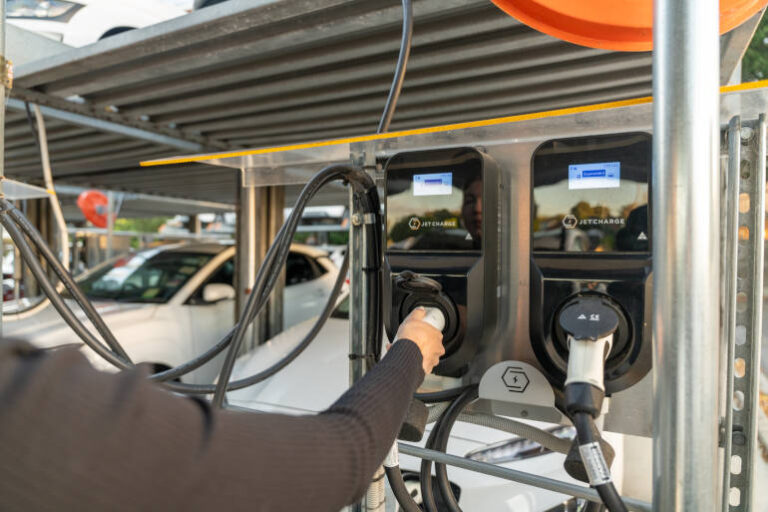As electric vehicles (EVs) continue to gain traction, fleet managers face unique challenges and opportunities. In a recent webinar, JET Charge explored how businesses can effectively transition to electric fleets by implementing tailored EV charging solutions. Here’s a summary of the key points.
The Two Main EV Charging Models: Ownership vs Charging as a Service (CaaS)
The webinar began by introducing the two primary options available to fleets for acquiring and managing EV chargers: owning and operating and charging as a service (CaaS). The first model involves purchasing and installing chargers, followed by managing them in-house. However, this can be complex, especially for large fleets.
JET Charge’s alternative solution, JET Charge Plus, offers charging as a service. This model bundles both the initial and ongoing costs into a manageable monthly subscription. Instead of bearing the upfront costs and risks, fleet managers can benefit from a smoother, more predictable cost structure over time.
Costs and Complexities in EV Charging
The webinar highlighted that installing and managing EV chargers is not as simple as it may seem. There are both tangible costs—such as hardware, installation, and maintenance—and intangible risks, like connectivity issues, technological obsolescence, and employee relocations.
Fleet managers must also consider the Total Cost of Ownership (TCO) when comparing EVs to internal combustion engine (ICE) vehicles. While EVs typically have higher acquisition costs, they offer lower maintenance, servicing, and fuel expenses. This makes them a more cost-effective solution in the long run, especially when factoring in the convenience and savings of home charging.
Home Charging: The Key to Maximising EV Efficiency
One of the most significant points discussed was the advantage of home charging, particularly for fleets with vehicles that rest at employees’ homes overnight. Home charging allows for lower electricity costs compared to public charging stations and reduces the need for frequent trips to commercial chargers.
JET Charge has found that fleet managers are increasingly focusing on this model due to its simplicity and cost-effectiveness. The company’s JET Charge Plus service makes home charging easier to manage by bundling hardware, installation, and ongoing service into a single, predictable subscription fee.
Case Study Insights
The webinar also shared real-world insights, based on JET Charge’s experience with customers over the past two years. Many businesses have already started transitioning to EVs, particularly in industries where vehicle utilisation is high, such as tool trade and passenger vehicle travel.
As fleets become more reliant on EVs, the need for reliable, cost-effective charging solutions becomes even more critical. JET Charge has worked with major retailers, local companies, and ASX 50 firms to streamline the EV transition process and ensure smooth operations for their electric fleets.
The Importance of Connectivity and Reimbursement Solutions
Connectivity is a crucial factor in ensuring the success of any EV charging solution. During the webinar, JET Charge emphasised the need for reliable internet connections at charging points, particularly in home environments where Wi-Fi signals may be weak. To combat this, JET Charge includes 4G modems in its chargers to ensure stable, consistent connectivity.
The issue of energy reimbursement was also raised. Fleet managers need to compensate employees for the electricity used to charge their EVs at home, and JET Charge has developed tools to simplify this process. The company’s smart chargers automatically record charging sessions and generate detailed reports, which can be used to calculate reimbursements accurately.
Predictable and Scalable Solutions with JET Charge Plus
For fleet managers, the prospect of managing a growing network of EV chargers can be daunting. JET Charge Plus addresses this concern by offering a subscription-based model that simplifies cost management. By removing the need for large upfront investments and reducing the administrative burden of maintaining the chargers, this model allows fleets to scale their EV infrastructure more easily.
The subscription service covers everything from initial installation to ongoing maintenance, firmware updates, and even proactive monitoring. This ensures that fleet vehicles remain operational without the risk of downtime due to faulty chargers or connectivity issues.
Intangible Benefits of Charging as a Service
In addition to the cost savings, JET Charge identified several intangible benefits of the charging as a service model. These include:
- Risk Mitigation: With JET Charge owning and managing the chargers, businesses avoid the risks associated with technological obsolescence, operational complexity, and compliance.
- Employee Satisfaction: A seamless charging experience encourages employees to adopt EVs, making the transition smoother and more appealing.
- Operational Efficiency: By outsourcing the management of EV chargers, fleet managers can focus on core business operations instead of dealing with the technicalities of running an EV infrastructure.
Final Thoughts
The webinar concluded by reinforcing the value of JET Charge’s charging as a service model for businesses looking to transition to electric fleets. The combination of cost predictability, risk reduction, and ease of scalability makes JET Charge Plus an attractive option for fleet managers seeking a hassle-free solution to their EV charging needs.
For businesses ready to embrace the EV revolution, investing in an efficient, reliable, and scalable charging solution like JET Charge Plus could be the key to ensuring long-term success.






